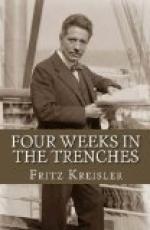The rest, however, was of very short duration, for at six o’clock in the morning we were aroused, camp was broken up and soon afterwards we started on a forced march of twenty-two miles without a halt, during which we twice had to wade knee-deep through rivers. By midday most of the men were so exhausted that they could hardly crawl along. It was remarkable that the comparatively weaker and more refined city-bred people who had done little physical work in their lives, most of them being professional men, withstood hardships better than the sturdy and, to all appearances, stronger peasants; the only explanation for it being perhaps that the. city-bred people, in consequence of their better surroundings and by reason of their education, had more will power and nervous strength than the peasants.
At half-past two we reached a clearing in the midst of a wood through which a river flowed. Here camp was again established and a half hour later all the hardships of the march were once more forgotten in the bustle of camp life. This time we had a full rest until the next morning at four o’clock, when suddenly orders for marching were given. After we had been under way for about three hours we heard far-away, repeated rumbling which sounded like distant thunder. Not for a moment did we associate it with cannonading, being, as we supposed, hundreds of miles away from the nearest place where Russians could possibly be. Suddenly a mounted ordnance officer came rushing with a message to our colonel. We came to a halt and all officers were summoned to the colonel who, addressing us in his usual quiet, almost businesslike way, said: “Gentlemen, accept my congratulations, I have good news for you, we may meet the enemy to-day and I sincerely hope to lead you to the fight before evening.” We were thunderstruck at the sudden realization that the Russians had penetrated so deeply into Galicia. The despondency which followed this startling revelation, however, was quickly replaced by the intense excitement of meeting the enemy so soon. We hurried back to our companies, imparting the news to the men, who broke forth into shouts of enthusiasm. All the fatigue so plainly noticeable only a few minutes before, suddenly vanished as if by magic, and every one seemed alert, springy, and full of spirit. We energetically resumed the march in the direction of the distant rumbling, which indicated that the artillery of our advance guard had engaged the enemy. My regiment then was part of the main body of a division. A second division advanced on the road parallel to ours, about a mile and a quarter to our left. Both columns belonged to the Third Army Corps and kept up constant communication with each other through mounted dispatch bearers and motor cycles.




